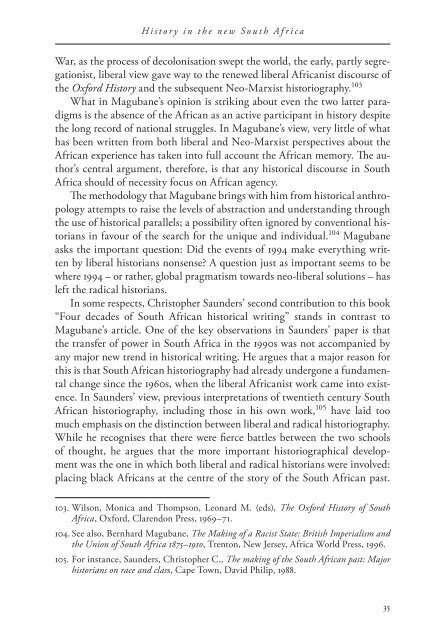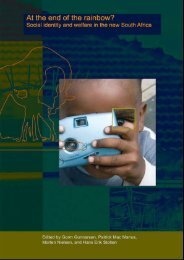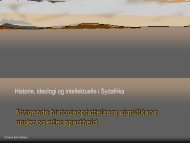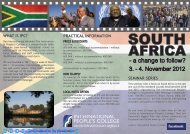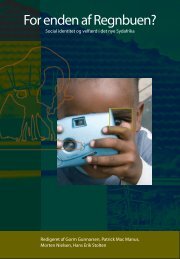History Making and Present Day Politics - Stolten's African Studies ...
History Making and Present Day Politics - Stolten's African Studies ...
History Making and Present Day Politics - Stolten's African Studies ...
You also want an ePaper? Increase the reach of your titles
YUMPU automatically turns print PDFs into web optimized ePapers that Google loves.
H i s t o r y i n t h e n e w S o u t h A f r i c a<br />
War, as the process of decolonisation swept the world, the early, partly segregationist,<br />
liberal view gave way to the renewed liberal <strong>African</strong>ist discourse of<br />
the Oxford <strong>History</strong> <strong>and</strong> the subsequent Neo-Marxist historiography. 103<br />
What in Magubane’s opinion is striking about even the two latter paradigms<br />
is the absence of the <strong>African</strong> as an active participant in history despite<br />
the long record of national struggles. In Magubane’s view, very little of what<br />
has been written from both liberal <strong>and</strong> Neo-Marxist perspectives about the<br />
<strong>African</strong> experience has taken into full account the <strong>African</strong> memory. The author’s<br />
central argument, therefore, is that any historical discourse in South<br />
Africa should of necessity focus on <strong>African</strong> agency.<br />
The methodology that Magubane brings with him from historical anthropology<br />
attempts to raise the levels of abstraction <strong>and</strong> underst<strong>and</strong>ing through<br />
the use of historical parallels; a possibility often ignored by conventional historians<br />
in favour of the search for the unique <strong>and</strong> individual. 104 Magubane<br />
asks the important question: Did the events of 1994 make everything written<br />
by liberal historians nonsense? A question just as important seems to be<br />
where 1994 – or rather, global pragmatism towards neo-liberal solutions – has<br />
left the radical historians.<br />
In some respects, Christopher Saunders’ second contribution to this book<br />
“Four decades of South <strong>African</strong> historical writing” st<strong>and</strong>s in contrast to<br />
Magubane’s article. One of the key observations in Saunders’ paper is that<br />
the transfer of power in South Africa in the 1990s was not accompanied by<br />
any major new trend in historical writing. He argues that a major reason for<br />
this is that South <strong>African</strong> historiography had already undergone a fundamental<br />
change since the 1960s, when the liberal <strong>African</strong>ist work came into existence.<br />
In Saunders’ view, previous interpretations of twentieth century South<br />
<strong>African</strong> historiography, including those in his own work, 105 have laid too<br />
much emphasis on the distinction between liberal <strong>and</strong> radical historiography.<br />
While he recognises that there were fierce battles between the two schools<br />
of thought, he argues that the more important historiographical development<br />
was the one in which both liberal <strong>and</strong> radical historians were involved:<br />
placing black <strong>African</strong>s at the centre of the story of the South <strong>African</strong> past.<br />
103. Wilson, Monica <strong>and</strong> Thompson, Leonard M. (eds), The Oxford <strong>History</strong> of South<br />
Africa, Oxford, Clarendon Press, 1969–71.<br />
104. See also, Bernhard Magubane, The <strong>Making</strong> of a Racist State: British Imperialism <strong>and</strong><br />
the Union of South Africa 1875–1910, Trenton, New Jersey, Africa World Press, 1996.<br />
105. For instance, Saunders, Christopher C., The making of the South <strong>African</strong> past: Major<br />
historians on race <strong>and</strong> class, Cape Town, David Philip, 1988.<br />
35


